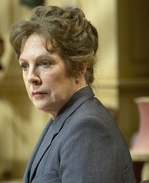SITE GUIDE
SEARCH
REVIEWS
REVIEW ARCHIVES
ADVERTISING AT CURTAINUP
FEATURES
NEWS
Etcetera and
Short Term Listings
LISTINGS
Broadway
Off-Broadway
NYC Restaurants
BOOKS and CDs
OTHER PLACES
Berkshires
London
California
New Jersey
DC
Philadelphia
Elsewhere
QUOTES
TKTS
PLAYWRIGHTS' ALBUMS
LETTERS TO EDITOR
FILM
LINKS
MISCELLANEOUS
Free Updates
Masthead
Writing for Us
A CurtainUp  London Review
London Review
 London Review
London ReviewThe Chalk Garden
|
Love can be had any day! Success is much harder.— Mrs St Maugham
|

Penelope Wilton as Miss Madrigal
(Photo: Manuel Harlan) |
The programme has a fascinating description as to how the play came about. Enid has inherited a prior family from her husband Sir Roderick Jones, a war wounded son, a young daughter in law and a three year old granddaughter for whom she engaged a nanny. It was when a friend, a judge, came to lunch that she noticed the strange and uncharacteristic reaction of the nanny which started Enid thinking. Enid loved words and she stuffed the witty expressions which she'd been collecting into her play, making it rather heavy going. London impresario Binkie Beaumont turned it down but Enid's agent Harold Freedman sent the play to Irene Selznick, daughter of Louis B Mayer. Selznick worked on the script with Enid, "to pull the threads straight" and curtailing Bagnold's excess of expression. The resulti was marvellously successful.
The play opens with a succession of applicants for the post of companion/governess to Mrs St Maugham's granddaughter Laurel (Felicity Jones). This is England at its most eccentric and two of the candidates leave before the interview has commenced.
Laurel turns out to be something of a handful. As her grandmother says, "Apart from a few fixations with fire, she's a charming girl." Miss Madrigal (Penelope Wilton) is the only candidate who stays to be interviewed. She gets the job and brings to the household a wonderful knowledge of plants and flowers, expert at what will and will not grow on the chalky soil of Mrs St Maugham's garden.
Laurel confides in Miss Madrigal that her mother has remarried and that her father shot himself. We also meet the manservant Maitland (Jamie Glover) terribly damaged by years spent in prison as a conscientious objector. The household seems to work well with the addition of Miss Madrigal but then Laurel's mother Olivia (Suzanna Burden) visits and so does the Judge (Clifford Rose) who tells us about a woman he once tried for murder.
While the second act conclusion is indecisive about Miss Madrigal, I feel it's where the play shows its age in that it seem to have too convenient a solution but maybe I am being unfair.
The set, a working room overflows with fascinating detail, plant pots and gardeners string and books. The people sit in those gorgeous Bergère chairs, mahogany frame, cane backs and sides, and sumptuous wide, loose, velvet cushions or on upholstered dining chairs. Old Persian rugs all add to the genuine atmosphere of a country house.
Margaret Tyzack's quirky English woman is a joy to behold. She's amusing, witty, candid and very individual. I also adored Penelope Wilton as Miss Madrigal,— interesting and sensible, never boring and always original in her approach to someone with such detailed botanical knowledge. In the first encounter with Laurel, Miss Madrigal is asked "Where do you live?" "In my room." she says, but obviously not intending to be mysterious.
Felicity Jones is perfect as the maladjusted Laurel who today would be seeing a child psychologist several times a week to deal with her anger towards her mother. Suzanne Burden too hits exactly the right note as Olivia, the estranged mother trying to connect with her daughter. As she says, "To have a child doesn't always make a mother." Olivia too has a strained relationship with her mother as the connecting generations clash. There are shortlived but memorable cameos from two of the candidates for the post, Steph Bramwell and Linda Broughton, who count themselves out.
This production deserves a full transfer so that more people can enjoy it. If American readers of this review are lucky, it may cross the Atlantic!
|
The Chalk Garden
Written by Enid Bagnold Directed by Michael Grandage Starring: Margaret Tyzack, Penelope Wilton With: Clifford Rose, Suzanna Burden, Steph Bramwell, Linda Broughton, Felicity Jones Design: Peter McKintosh Lighting: Paule Constable Composer and Sound: Adam Cork Running time: Two hours with one interval Production supported by Ralph Goldenberg and Anna Barbagallo Box Office: 0870 060 6624 Booking to 2nd August 2008 Reviewed by Lizzie Loveridge based on 11th June 2008 performance at the Donmar Warehouse, Earlham Street, London WC2 (Tube: Covent Garden) |
|
REVIEW FEEDBACK Highlight one of the responses below and click "copy" or"CTRL+C"
Paste the highlighted text into the subject line (CTRL+ V): Feel free to add detailed comments in the body of the email and state if you'd like your comments published in our letters section. |
|
London Theatre Tickets Lion King Tickets Billy Elliot Tickets Mighty Boosh Tickets Mamma Mia Tickets We Will Rock You Tickets Theatre Tickets |




